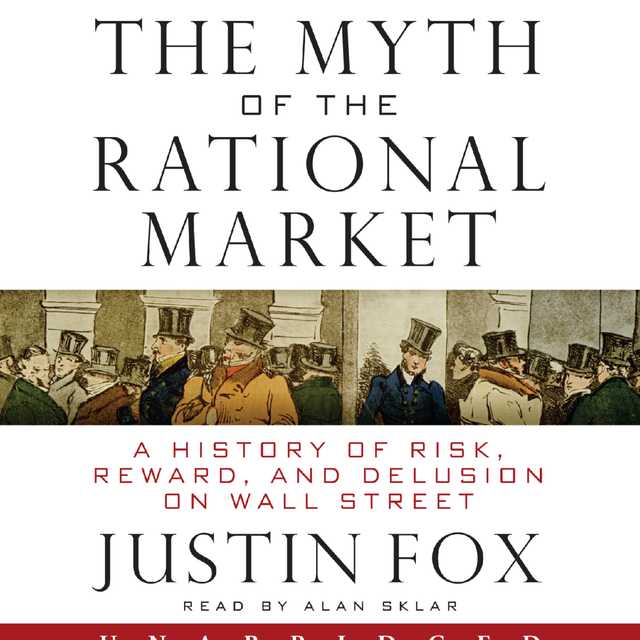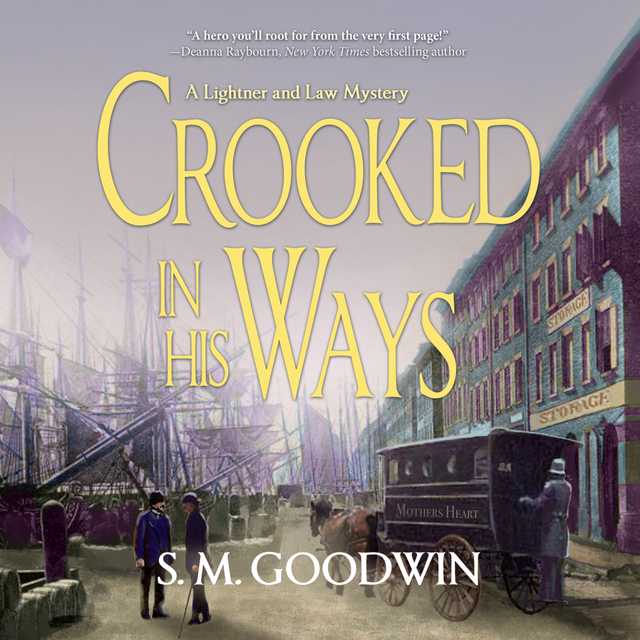The Myth of the Rational Market Audiobook Summary
“Do we really need yet another book about the financial crisis? Yes, we do–because this one is different….A must-read for anyone who wants to understand the mess we’re in.”
–Paul Krugman, New York Times Book Review
“Fox makes business history thrilling.”
—St. Louis Post-Dispatch
A lively history of ideas, The Myth of the Rational Market by former Time Magazine economics columnist Justin Fox, describes with insight and wit the rise and fall of the world’s most influential investing idea: the efficient markets theory. Both a New York Times bestseller and Notable Book of the Year–longlisted for the Financial Times Business Book of the Year Award and named one of Library Journal Best Business Books of the Year–The Myth of the Rational Market carries readers from the earliest days of Wall Street to the current financial crisis, debunking the long-held myth that the stock market is always right in the process while intelligently exploring the replacement theory of behavioral economics.
Other Top Audiobooks
The Myth of the Rational Market Audiobook Narrator
Alan Sklar is the narrator of The Myth of the Rational Market audiobook that was written by Justin Fox
Justin Fox is editorial director of the Harvard Business Review Group, and a contributor to Time magazine and PBS’s Nightly Business Report. Previously, he was a columnist at Time and an editor and writer at Fortune. He lives in Cambridge, Massachusetts, with his wife and son.
About the Author(s) of The Myth of the Rational Market
Justin Fox is the author of The Myth of the Rational Market
More From the Same
- Author : Justin Fox
- The Cape Raider
- Publisher : HarperAudio
- Abraham
- American Gods [TV Tie-In]
- Dead Ringer
- House of Sand and Fog
- Prey
The Myth of the Rational Market Full Details
| Narrator | Alan Sklar |
| Length | 13 hours 38 minutes |
| Author | Justin Fox |
| Category | |
| Publisher | HarperAudio |
| Release date | February 09, 2010 |
| ISBN | 9780061990892 |
Subjects
The publisher of the The Myth of the Rational Market is HarperAudio. includes the following subjects: The BISAC Subject Code is Business & Economics, Economic History
Additional info
The publisher of the The Myth of the Rational Market is HarperAudio. The imprint is HarperAudio. It is supplied by HarperAudio. The ISBN-13 is 9780061990892.
Global Availability
This book is only available in the United States.
Goodreads Reviews
Joe
July 06, 2017
While I think John Cassidy's How Markets Fail: The Logic of Economic Calamities is more accessible, this book definitely covers more ground. I think anyone planning on reading this book, though, might do better to start with The Undoing Project: A Friendship That Changed Our Minds by Michael Lewis, because an understanding of Prospect Theory and Behavioral Economics would go a long way to understanding why the Efficient Market Hypothesis is based on false premises (the biggest false premise being the belief in rational actors). While the Efficient Market Hypothesis is an important and usable model for equities, and this book does make sure to emphasize that, it is a limited model that is not always correct. In fact, when it is wrong, it is very wrong. In the end, attempts to beat the market will always fail. More importantly: efforts to beat the market by creating new derivatives or other financial products will always lead to financial disaster.
Eugene
August 02, 2015
The book is very valuable to read. The explanation of how some theories help institutions and at other times hinder them is a helpful way to understand how not to be overly reliant on any specific set of ideas. The drawbacks of this book is the lack of consistency. The author's transitions from topic to topic are not very smooth to the point where it is difficult to grasp where one topic ends and another begins. There where many times in the book where the author gave very good descriptions of the theory behind a certain paper or person, but many times were the author wants to the readers to be credulous to theory without a proper explanation. In the 1st part of the book, it seems that some descriptions were of Bayesian Theory yet there was no mention of him. The best part about this book is to see the interconnections between various people who helped progress the field of economics. There are many insights in this book.
The Angry Lawn Gnome
March 21, 2013
Two brief comments, more for my own recollection than anything else:(1) I do wish Fox had gotten a bit more into discussing the attempts by economists to try and make their discipline more of a "hard" science and less of a "social" science. It seems to me that that is ultimately what is behind the attempt to create an edifice like the EMH, as well as things like "homo economicus," the "rational expectations" theory and so forth. The discussion of Thomas Kuhn's book was fascinating but I do wish there was more of it.(2) I wonder where I can go to get a refund of that part of my undergraduate tuition that was spent being forcefed the EMH in the mid-'80s? :) I was surprised to find out that the whole theory was under attack even then. Trust me, you'd never have known that in the classes I took.I wish I felt comfortable saying more. But while I found the book intriguing, I've been away from so much of it for so long I'd doubtless commit many errors.
Ram
January 21, 2013
A very readable narrative of economic history through the last 120 years or so. The author clearly enjoys the intellectual battle of economic ideas between the quantitative efficient marketers of the Chicago school and the behaviorists who are more skeptical of any dubious claims of "the market is always right" crowd. Great spirited debate between the great finance intellectuals and Nobel laureates described here. I was left with the sneaking suspicion that a lot of brainpower has been wasted in Finance rather than in genuine wealth-creating and society-improving activities! Finance should perhaps be the (overhead) grease that oils society rather than an end in itself? Anyway, great book with exhaustive research - read it.
Gregory
April 13, 2021
This is a very well-written and engaging book that is surprisingly readable, given its topic of finance theory and its effects on public policy and the stock market. The author breaks down complex ideas or simply skips over them (“a lot of equations led to the conclusion that...” kind of thing) so that readers like me with only the most basic knowledge of the topic could get through it. I suspect that an equally effective book could have been written for readers at my level of interest that was 100 pages shorter. The plethora of names eventually became hard to keep track of, until I remembered that there is a glossary of names at the end. That was valuable—and necessary. Anyway, I have to say that the book was a relative page-turner, given the dry topic. Not at the level of Michael Lewis page-turning, but still pretty good. The theoretical aspects are leavened by personal stories of the people involved and gossip about the competition of business schools and economics departments in hiring or rejecting the people involved.The main issue is whether the stock market accurately evaluates stocks, given the limited information that everyone has about them. The efficient (rational) market hypothesis says that stock prices are as accurate as they possibly can be. The collective effect of everyone’s opinion results in the stock’s price including all the knowledge and opinions that people have. If they didn’t, then someone would take advantage of the wrong price, thereby driving the price to its correct level. The upshot of this idea is that individual investors and advisers are not going to beat the market consistently, a consequence that gave rise to mutual funds and in particular index funds, which buy an entire sector of the market, rather than try to pick winners and losers.This hypothesis has served for government policy for decades and created a slew of investment models. The cracks in the theory have always been there, but they did not bring the edifice down. Clearly non-rational events like bubbles and crashes are often relatively short-term and limited. Furthermore, after a crash, wise investors like Warren Buffett start buying up stocks again, driving their price back to the “correct” level. However, eventually research on price variability and the vast errors in human judgment began to erode the theory’s hegemony, such that now there is really no well-accepted theory to take its place. Which may be good.One of the most interesting ideas in the book is how people who wrote investing algorithms to take advantage of the rational market theory ended up having the effect of undermining the theory. For example, if everyone invests in index funds, which buy stocks in the entire market, then the rational market hypothesis will fail, because no one is deciding the actual value of the stocks in the index. Other, more complex strategies worked for a while, especially for hedge funds that developed them, until too many people used that strategy, causing a boom and bust that had no connection to the underlying value of the companies putting out the stocks involved. The financial crash of 2008-9 served as the final nail in the coffin of rational markets, as it was generated by terrible financial instruments that were grossly mis-priced, and that eventually crashed, leading to a worldwide recession. That does not sound like a rational market.With a little background in the stock market, most interested readers would learn much from this book.
MasterSal
April 28, 2018
I started this book a number of years ago and left it with a few chapters left due to work pressures. Finally finished it and I must say it remains an engaging read. Most of this is not going to be new for people following economics over the last few years but it is a concise summary of how financial markets have considered risk. As a ex-finance perspective I can say this the sckeptism often noted by professionals regarding the theoretical models was ignored a little except near the end. I clearly remember talking to the captain market / security desks whose general reactions to all these pricing models was one of resignation not unthinking belief. Not sure if the casual reader will enjoy this book since there is a huge cast of characters who do get muddled if one is not familiar with finance and economist history. This is not as much of an introductory text that I was expecting. However it is still worth reading for people who want to understand how the markets have been structured recently. For me - I liked going back and reading around some of the texts he mentioned. It took forever to finish he book but the journey was a lot of fun!
Pedro
February 27, 2018
Very good summary of the main developments in the rational thinking of how markets work. Justin is a journalist and the book take that catch, however without leaving several notes and technical explanations of the important concepts.The author focuses on the important ideas that surrounded the developments of market instruments, technicalities, strategies and wealth.There are good stories on the sell and buy side, specially the money management industry, and its relationship with nobel-prized scholars. Last but not least, good introduction on how behavior economics took the attention and left the old giants of finance theory in trouble to sustain old concepts as stated in the 70's or 80's.
Tyler
January 07, 2022
Entertaining for a book about finance (though I did skim fairly quickly at the end)! It was a nice companion to some of the finance topics we covered in class this year and interesting to see how a major academic idea was both developed and then pushed back against. I also appreciated how the author was careful to explain the difference between efficient financial markets and efficient markets in general, this quote summarizes:"The prices prevailing on [financial] markets give signals about the future, which are nice things to have, even if they turn out to be wrong much of the time. The price of eggs in a free market, though, is never "wrong." It simply is what it is. Financial instrument prices are different. They're bets."
M.R.
September 25, 2018
One of the most difficult book to finish but when i did, i emerged more knowledgeable! In what appears to be a academic domain, Justin Fox managed to appeal to lay readers like me in connecting the dots to the much debated efficient market hypothesis. True to the title, the author veers towards behavioral aspects of markets and presents both sides of the story (rational vs. irrational) very well.
Joe
April 04, 2020
I found this book extremely interesting. It goes through pretty much the entire history of the stock market, most of the fundamental economic theory / key players and details every major event / era. I liked it. It wasn't overly technical and primarily got the key points and stories across in a very engaging and page turning manner. Really enjoyed this one.
Jak
February 27, 2021
I'm bad with names and this book is understandably chocked full of them. Fox did a great job making this an enjoyable read and not a sprawling epic. Thankful humans are rational. $GME to the moon.
Matthew
September 08, 2019
A magisterial tour of the history and territory behind the quant's smoke-curtain of stats.
Frequently asked questions
Listening to audiobooks not only easy, it is also very convenient. You can listen to audiobooks on almost every device. From your laptop to your smart phone or even a smart speaker like Apple HomePod or even Alexa. Here’s how you can get started listening to audiobooks.
- 1. Download your favorite audiobook app such as Speechify.
- 2. Sign up for an account.
- 3. Browse the library for the best audiobooks and select the first one for free
- 4. Download the audiobook file to your device
- 5. Open the Speechify audiobook app and select the audiobook you want to listen to.
- 6. Adjust the playback speed and other settings to your preference.
- 7. Press play and enjoy!
While you can listen to the bestsellers on almost any device, and preferences may vary, generally smart phones are offer the most convenience factor. You could be working out, grocery shopping, or even watching your dog in the dog park on a Saturday morning.
However, most audiobook apps work across multiple devices so you can pick up that riveting new Stephen King book you started at the dog park, back on your laptop when you get back home.
Speechify is one of the best apps for audiobooks. The pricing structure is the most competitive in the market and the app is easy to use. It features the best sellers and award winning authors. Listen to your favorite books or discover new ones and listen to real voice actors read to you. Getting started is easy, the first book is free.
Research showcasing the brain health benefits of reading on a regular basis is wide-ranging and undeniable. However, research comparing the benefits of reading vs listening is much more sparse. According to professor of psychology and author Dr. Kristen Willeumier, though, there is good reason to believe that the reading experience provided by audiobooks offers many of the same brain benefits as reading a physical book.
Audiobooks are recordings of books that are read aloud by a professional voice actor. The recordings are typically available for purchase and download in digital formats such as MP3, WMA, or AAC. They can also be streamed from online services like Speechify, Audible, AppleBooks, or Spotify.
You simply download the app onto your smart phone, create your account, and in Speechify, you can choose your first book, from our vast library of best-sellers and classics, to read for free.
Audiobooks, like real books can add up over time. Here’s where you can listen to audiobooks for free. Speechify let’s you read your first best seller for free. Apart from that, we have a vast selection of free audiobooks that you can enjoy. Get the same rich experience no matter if the book was free or not.
It depends. Yes, there are free audiobooks and paid audiobooks. Speechify offers a blend of both!
It varies. The easiest way depends on a few things. The app and service you use, which device, and platform. Speechify is the easiest way to listen to audiobooks. Downloading the app is quick. It is not a large app and does not eat up space on your iPhone or Android device.
Listening to audiobooks on your smart phone, with Speechify, is the easiest way to listen to audiobooks.






























